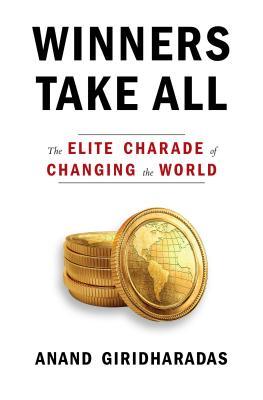
This book was a mixed bag for me. Overall the information contained in this book is really enlightening and the authors own personal insights are really valuable but the book felt like a bit of a chore to read, and I am no stranger to dense or dull non-fiction so it wasn't that.
This book does an interesting thing, it builds a world out of real people and events. Giridharadas marks a bunch of real world actors and places them into a group that he deems MarketWorld. This is a really interesting way of writing a non-fiction book that puts you into a different rung of society than the reader might normally be exposed to. The people in this book don't necessarily self identify as part of some specific group or archetype but as an outsider the author is able to see some structure and attempts to define it and criticize it with this book. He does a fantastic job and shines a light on the hubris and and disconnect the ultra wealthy have in regards to doing good in the world. Each chapter focuses on a crucial element in this machine and Giridharadas really sells the connection between these elements, through intersections of individuals and/or intersections of ideologies. The settings in this book are outstanding and foreign for the average person, ranging from Silicon Valley, elite academic training grounds, the professional speaking circuit and the Clinton Global Initiative. Seeing how insulated these powerful elites are in their environments and protected from certain ways of approaching problem solving makes it apparent and understandable that in spite of their resources they would have such shortcomings when it comes to thinking about solutions to some of our biggest social problems.
One of my biggest problems with Giridharadas writing in this book is in how he introduces characters. This book features so many people, all of whom are valuable characters to his overall thesis, but each time he introduces someone he essentially gives their entire resume. I understand the point of this, as I said he uses these things to draw a bigger picture of how these different pieces fit together into the larger MarketWorld. I suppose it's good to have the information there but often it felt more like he was trying to overwhelm you with how entrenched the individual is in MarketWorld rather than give you relevant information, I often just skipped these long paragraphs which were essentially lists. A lot of other paragraphs in this book were written in a similar way, for instance if he wanted to highlight some of the ways a prevalent philanthropist made their money in problematic ways he would write these huge run on list paragraphs which once again gave me the impression of trying to overwhelm the reader to prove his point. I could see how this might be valuable to someone who just had never considered that large wealth is often built in a number of problematic ways but for most people reading this book I suspect it isn't news. I just felt that such a significant portion of this book is dedicated to these list paragraphs that were super tedious and in the second half of the book I often just skipped over them scanning through for any part that might have additional information because it just grew too tedious. To me that doesn't feel good, maybe it's neurotic but I like to read every word in a book, partly because it helps to build momentum and hold my interest but I just couldn't with this book.